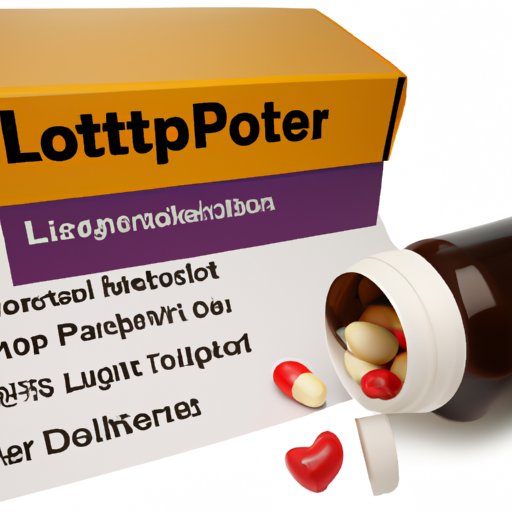Introduction
High cholesterol is a major risk factor for heart disease, stroke, and other serious medical conditions. To manage high cholesterol levels, many doctors prescribe statin drugs like Lipitor (atorvastatin calcium). But what exactly is Lipitor and how does it work? In this article, we’ll explore the mechanism of action of Lipitor, its benefits, possible side effects, interactions with other medications, and comparison with other statin drugs.

Exploring the Mechanism of Action of Lipitor
Lipitor belongs to a class of drugs known as statins, which are used to lower cholesterol levels in the blood. Specifically, Lipitor works by inhibiting an enzyme called HMG-CoA reductase, which plays a key role in the production of cholesterol in the body. By blocking this enzyme, Lipitor reduces the amount of cholesterol produced by the liver, resulting in lower levels of “bad” LDL cholesterol in the bloodstream.
In addition to reducing LDL cholesterol, Lipitor can also raise levels of “good” HDL cholesterol and lower triglycerides, another type of fat found in the blood. According to a study published in the journal Circulation, Lipitor significantly reduced levels of LDL cholesterol, increased levels of HDL cholesterol, and lowered triglyceride levels in patients with coronary artery disease.

Investigating the Benefits of Lipitor for Cholesterol Management
By reducing LDL cholesterol and raising HDL cholesterol, Lipitor has been shown to reduce the risk of cardiovascular events such as heart attack and stroke. A meta-analysis of 13 randomized clinical trials involving over 29,000 participants showed that the use of Lipitor was associated with a significant reduction in the risk of major cardiovascular events. The same analysis also found that Lipitor reduced the risk of death from any cause by 11%.
In addition, Lipitor has been shown to reduce the risk of peripheral arterial disease, a narrowing of the arteries in the legs that can lead to pain and difficulty walking. A study published in the New England Journal of Medicine found that Lipitor reduced the risk of peripheral arterial disease by 25% compared to placebo.

Unpacking the Possible Side Effects of Lipitor
As with any medication, Lipitor can cause side effects in some people. Common side effects include headache, diarrhea, constipation, and nausea. Less common side effects may include rash, itching, and muscle and joint pain.
It’s important to note that Lipitor can also cause more serious side effects, including liver damage, muscle breakdown, and memory loss. If you experience any of these symptoms while taking Lipitor, seek medical attention right away.
Examining Lipitor’s Interaction with Other Medications
Lipitor can interact with certain medications, including antifungal drugs, antibiotics, and HIV/AIDS medications. It’s important to tell your doctor about all medications you are taking before starting Lipitor, as some of these drugs may make Lipitor less effective or increase the risk of side effects.
Comparing Lipitor to Other Statin Drugs
Lipitor is one of several statin drugs available on the market today. Other popular statins include Crestor (rosuvastatin) and Zocor (simvastatin). While all statin drugs work in a similar way to reduce LDL cholesterol, there are some differences between them. For example, Lipitor is more potent than other statins and may be more effective at lowering LDL cholesterol. On the other hand, Crestor and Zocor have been shown to be more effective at raising HDL cholesterol.
When choosing a statin drug, it’s important to consider your individual needs and risk factors. Your doctor can help you determine which statin is best for you.
Conclusion
Lipitor is a commonly prescribed statin drug used to reduce LDL cholesterol and improve cardiovascular health. Its mechanism of action involves blocking an enzyme involved in the production of cholesterol, which leads to lower levels of LDL cholesterol and higher levels of HDL cholesterol. Lipitor has been shown to reduce the risk of cardiovascular events such as heart attack and stroke, as well as the risk of peripheral arterial disease. However, Lipitor can cause side effects, including more serious ones such as liver damage and muscle breakdown. It’s also important to inform your doctor about all medications you are taking, as Lipitor can interact with certain drugs. Finally, it’s important to consider your individual needs and risk factors when choosing a statin drug.
(Note: Is this article not meeting your expectations? Do you have knowledge or insights to share? Unlock new opportunities and expand your reach by joining our authors team. Click Registration to join us and share your expertise with our readers.)
